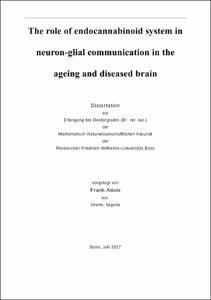The role of endocannabinoid system in neuron-glial communication in the ageing and diseased brain

The role of endocannabinoid system in neuron-glial communication in the ageing and diseased brain

| dc.contributor.advisor | Bilkei-Gorzo, Andras | |
| dc.contributor.author | Ativie, Frank | |
| dc.date.accessioned | 2020-04-24T11:44:25Z | |
| dc.date.available | 2020-04-24T11:44:25Z | |
| dc.date.issued | 13.12.2017 | |
| dc.identifier.uri | https://hdl.handle.net/20.500.11811/7312 | |
| dc.description.abstract | The endocannabinoid system has been implicated in the regulation of glial activity and progression of brain ageing. Mice constitutively or specifically lacking the cannabinoid receptor 1 (CB1) on neurons or GABAergic neurons respectively have been reported to show symptoms of accelerated cellular and behavioural brain ageing. However, the particular cell type(s) and the mechanisms involved in this process have not been exhaustively elucidated. This study showed that inadequate regulation of immune response could be a possible phenomenon leading to the increased inflammation following GABA-CB1 deletion and this disturbed immune cell regulation becomes exacerbated in cases of chronic LPS challenge with increasing ageing. In addition, GABA-CB1 deletion caused enhanced accumulation of the ageing and senescence marker lipofuscin in isolated microglia, suggesting that microglial cells may be the major cell type containing the increased lipofuscin accumulation reported in hippocampal immunohistological staining. Moreover, a reduced 2-AG production following microglia-specific Daglα deletion led to upregulation of immune regulator proteins which neither influenced cytokine production nor affected social and cognitive abilities. Furthermore, increased anandamide level after FAAH deletion led to increased microglia activity with age-associated exacerbation. These findings, together, indicate that GABA-CB1 receptor-mediated cannabinoid signalling is crucial in the regulation of microglial activity in young as well as in aged animals, though the consequences of a deficient GABA-CB1 activity only become visible and eventually detrimental with increasing age. | en |
| dc.language.iso | eng | |
| dc.rights | In Copyright | |
| dc.rights.uri | http://rightsstatements.org/vocab/InC/1.0/ | |
| dc.subject | Neuroinflammation | |
| dc.subject | Mikroglia | |
| dc.subject | Endocannabinoide | |
| dc.subject | Alterung | |
| dc.subject | Microglia | |
| dc.subject | Endocannabinoids | |
| dc.subject | Ageing | |
| dc.subject.ddc | 570 Biowissenschaften, Biologie | |
| dc.title | The role of endocannabinoid system in neuron-glial communication in the ageing and diseased brain | |
| dc.type | Dissertation oder Habilitation | |
| dc.publisher.name | Universitäts- und Landesbibliothek Bonn | |
| dc.publisher.location | Bonn | |
| dc.rights.accessRights | openAccess | |
| dc.identifier.urn | https://nbn-resolving.org/urn:nbn:de:hbz:5n-49226 | |
| ulbbn.pubtype | Erstveröffentlichung | |
| ulbbnediss.affiliation.name | Rheinische Friedrich-Wilhelms-Universität Bonn | |
| ulbbnediss.affiliation.location | Bonn | |
| ulbbnediss.thesis.level | Dissertation | |
| ulbbnediss.dissID | 4922 | |
| ulbbnediss.date.accepted | 29.11.2017 | |
| ulbbnediss.institute | Medizinische Fakultät / Institute : Institut für Molekulare Psychiatrie (IMP) | |
| ulbbnediss.fakultaet | Mathematisch-Naturwissenschaftliche Fakultät | |
| dc.contributor.coReferee | von der Emde, Gerhard |
Dateien zu dieser Ressource
Das Dokument erscheint in:
-
E-Dissertationen (4483)




